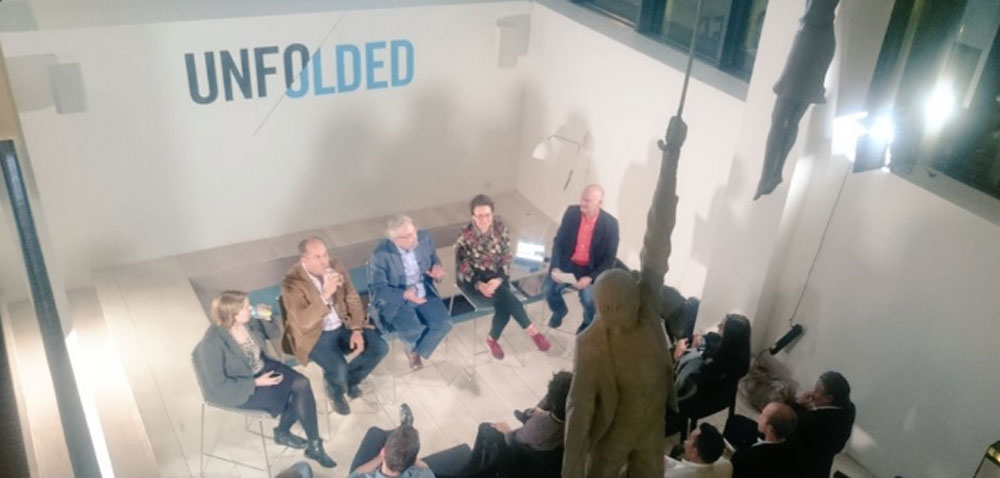One thing’s for sure: digital media has been blamed for a lot of society’s ills. And that’s despite its massive - and increasing - global popularity, with one piece of research showing that we touch our phones an average of 2,500 times daily, with 80% of our time spent on just five apps.
Two of digital’s most-popular by-products, social media and gaming, were put under the microscope by a series of speakers at Unfolded, an event organised by London-based creative agency Fold7 and held yesterday night.
 Source: Fold7. L-R: Lewis, Talks, Dunbar, Good
Source: Fold7. L-R: Lewis, Talks, Dunbar, Good
First up was Professor Robin Dunbar, an Oxford academic and creator of Dunbar’s Number, which suggests that humans can comfortably maintain only 150 stable relationships. Then came Helen Lewis, deputy editor of political magazine The New Statesman and inventor of another social metric: Lewis’ law holds that “the comments on any article about feminism justify feminism”. Also speaking were Martin Talks, founder of Digital Detoxing - a company that takes participants on activity holidays on the proviso they leave their devices behind - and cyber psychologist Berni Good, an academic expert on gaming.
Dunbar is a definite social media sceptic. His number is historically justified by the fact that the average village size in England, as recorded in the 11th-century Domesday Book was 150, a number that was still stable seven centuries later. And the number holds true today, with the modal number of Facebook friends standing at 150-200.
But, at the same time, he suggested that Facebook isn’t a truly ‘social’ experience as our ancestors understood. Proven community-building experiences, from organised religion to shared laughter, are more difficult when you are in a room, alone, looking at a screen. Scientific research shows that you are 30 times more likely to laugh at a funny video if you are watching with a few other people in the room; but Facebook scrolling tends to be done on your own. “You can’t - at the moment - have religious rituals and sing and dance on the internet,” he said. “You can only talk.”
Lewis was also firmly in the sceptics column, and her concern was in social media’s power to reinforce pre-existing political beliefs, and shut out opposing voices. And the problem is only set to worsen, as the tech giants find out more about our likes and dislikes, and adjust their services accordingly. “Online targeting reduces serendipitous collisions,” she added. “And this is very unlike our offline lives.”
One academic study from the US suggests that internet access makes people more extreme in their views. Which explains why out of the mainstream leaders like Donald Trump and Jeremy Corbyn tend to find especially fervent support online.
We live in a world in which we progressively shut out opposing voices on social media, because they are unpleasant to us to hear, and we can make them disappear with a click. And it’s a practice that Lewis - who has suffered a lot of online abuse - still finds useful and necessary, despite the possibility of living in a “filter bubble that makes you more extreme” as a result. “You might decide, as I have - just mute everybody!”
Unsurprisingly for the head of a company called Digital Detoxing, Talks is also a sceptic. To him, the internet as a whole, not just social media, lowers productivity and makes us less happy. A detox, on the other hand, makes you more creative and better looking - as you’re more likely to have fun and be merry without checking your phone constantly. “We need downtime from devices for our unconscious processes to work,” he added. Plus, death by status update is officially a social menace: one report suggested that more people died from selfies than from shark attacks in 2015.
It was left to Good to defend the social utility of social media - and she did with a barrage of scientific evidence. She suggested that, far from alienating us or trapping us in a bubble, social media and gaming actually counter loneliness - and can help lonely groups, such as the elderly, connect with each other.
Good pointed to a paper on Self Determination Theory, suggesting that gameplay helps players meet needs intrinsic to human happiness: autonomy, relatedness and competence. “This works in all virtual worlds - but especially gaming,” she added. Hence certain Facebook friends’ relentless updates on their progress through Candy Crush: they are making progress, and want to share this with people they know. It follows that social media usage actually helps us collaborate and work on a common goal.
This is backed by a recent paper suggesting that social media actually builds empathy among adolescents. “It’s not all bad news that young people are looking at their phones all the time,” Good said. “They are building their emotional intelligence and empathy.”
So, maybe our 150-strong social media powered “filter bubble” makes us better people. Maybe it doesn’t. But the number of bubbles is growing and growing. Latest figures show that 1.7bn people are on Facebook - and the total is growing at a rate of 20m a month.